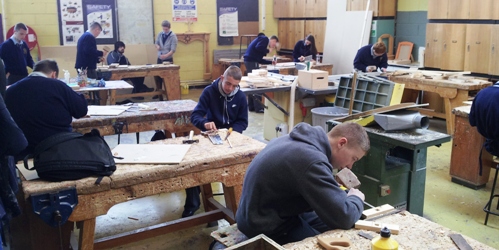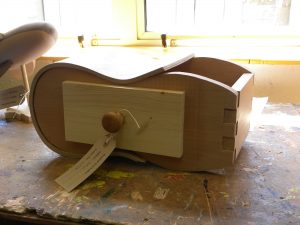If you’re curious about construction studies and woodwork, you’ve come to the right place! In this article, we’ll answer the burning question, “Is construction studies woodwork?” So, whether you’re interested in building, designing, or crafting things with your hands, this is the place to be!
Construction studies and woodwork go hand in hand when it comes to learning about structures, materials, and craftsmanship. But is construction studies exclusively about woodwork? Let’s dive in and find out!
So, grab your tools and buckle up as we explore the exciting world of construction studies and its association with woodwork. Let’s get started!

Is Construction Studies Woodwork? Understanding the Relationship
In the world of construction and woodworking, there is often confusion regarding the relationship between construction studies and woodwork. Many people wonder if construction studies and woodwork are the same thing or if they are distinct disciplines within the construction industry. In this article, we will delve into this topic to provide a clear understanding of the relationship between construction studies and woodwork, clarifying any misconceptions along the way.
The Distinction between Construction Studies and Woodwork
Construction studies and woodwork are closely related but not interchangeable terms. Construction studies encompass a broader field that involves various aspects of the construction industry, including architecture, engineering, project management, and carpentry. It involves learning about construction techniques, materials, safety protocols, and other related topics.
Woodwork, on the other hand, specifically refers to the crafting and manipulation of wood to create functional or decorative items. It is a specific skill within the construction studies field that focuses on woodworking tools, joinery techniques, and woodworking principles. Woodwork encompasses tasks like shaping, cutting, carving, sanding, and finishing wooden materials to produce furniture, cabinetry, and other wooden structures.
In summary, construction studies is a broader field that covers various aspects of the construction industry, while woodwork is a specialized skill within this field that focuses specifically on woodworking techniques.
Benefits of Studying Construction Studies and Woodwork
Studying construction studies and woodwork can offer numerous benefits for individuals interested in the construction industry or woodworking as a career. Some of the key benefits include:
- Enhanced Practical Skills: Both construction studies and woodwork involve hands-on work, allowing students to develop practical skills that are highly valued in the industry.
- Career Opportunities: With the knowledge gained from studying construction studies and woodwork, individuals have a wider range of career opportunities in fields such as carpentry, construction management, architecture, or even entrepreneurship in their own woodworking businesses.
- Understanding of Construction Techniques: Construction studies provide a comprehensive understanding of construction techniques, including those specific to woodwork. This knowledge can be applied to various construction projects, not just wood-based ones.
- Creativity and Artistry: Woodwork allows individuals to express their creativity and artistry through the creation of unique, handmade pieces. It offers a rewarding outlet for those with a passion for design and woodworking.
Construction Studies vs. Woodwork: Which One Should You Choose?
Choosing between construction studies and woodwork ultimately depends on your interests, career goals, and personal preferences. If you have a passion for woodworking and want to specialize in creating wooden structures and furniture, pursuing studies in woodwork may be the right choice for you. On the other hand, if you have a broader interest in the construction industry as a whole and want to gain a more comprehensive understanding of construction techniques, management, and design, then construction studies would be a more suitable path.
Tips for Success in Construction Studies and Woodwork
Whether you choose to focus on construction studies or woodwork, here are some tips to help you succeed:
- Practice Regularly: Consistent practice is key to improving your skills in construction studies and woodwork. Set aside dedicated time to work on projects and hone your craft.
- Seek Mentorship and Guidance: Find experienced professionals or teachers who can guide you in your studies and provide valuable insights and advice.
- Stay Updated: The construction industry is constantly evolving, so it’s important to stay updated on the latest techniques, tools, and trends. Attend workshops, seminars, or industry events to keep up with new developments.
- Network: Build connections within the construction industry or woodworking community. Networking can open up opportunities for mentorship, collaboration, and future job prospects.
Understanding the Scope of Woodwork in Construction Studies
Woodwork is a fundamental aspect of construction studies that holds significant value in the construction industry. In this section, we will explore the scope of woodwork within the broader field of construction studies, shedding light on its importance and applications.
The Significance of Woodwork in Construction
Woodwork plays a vital role in construction, offering strength, versatility, and aesthetic appeal. It has been used for centuries in the construction of various structures, from residential homes to grand architectural wonders. Wood’s natural properties make it an excellent choice for structural elements, such as beams, columns, and framing, as well as decorative elements like trim, molding, and furniture.
Within construction studies, woodwork is essential for understanding the characteristics of different types of wood, selecting appropriate wood for a specific project, and utilizing woodworking tools and techniques to shape and join wood pieces effectively. Through woodwork, construction professionals can create structurally sound and visually pleasing wooden structures that meet both functional and aesthetic requirements.
Woodwork also offers unique sustainability benefits. Wood is a renewable resource when sourced responsibly, and utilizing wood in construction projects helps mitigate the environmental impact of the built environment. Additionally, wood structures have a lower carbon footprint compared to those made from materials like concrete or steel.
The Applications of Woodwork in Construction
Woodwork finds application in various aspects of construction, contributing to different stages and elements of a project. Some common applications of woodwork in construction studies include:
- Framing: Wood is commonly used for framing structures, providing the framework and support for walls, floors, and roofs.
- Cabinetry and Furniture: Woodwork is integral to the creation of cabinetry, furniture, and other interior elements that require skilled woodworking techniques and craftsmanship.
- Flooring and Paneling: Wood is a popular choice for flooring and wall paneling, offering warmth, durability, and natural beauty to interior spaces.
- Outdoor Structures: Woodwork is commonly employed in the construction of outdoor structures like decks, fences, pergolas, and garden furniture.
The applications of woodwork in construction are vast and encompass both functional and decorative elements. From structural framing to intricate woodworking details, woodwork adds value and enhances the overall aesthetics of a construction project.
Is Construction Studies Woodwork?
Construction studies can include woodwork, but it is not limited to just that.
Key takeaways:
- Construction studies cover various aspects of building and construction.
- Woodwork is a common component of construction studies.
- Construction studies also encompass other materials like steel, concrete, and brick.
- Students learn practical skills and theoretical knowledge related to construction.
- Construction studies prepare individuals for careers in the construction industry.
Frequently Asked Questions
Welcome to our Frequently Asked Questions section on construction studies and woodwork! Here, we address some common queries related to the topic. If you’re curious about construction studies and its relationship to woodwork, you’ve come to the right place. Read on to find answers to your burning questions!
What is the difference between construction studies and woodwork?
Construction studies and woodwork are related but distinct subjects. Construction studies covers a broader range of skills and knowledge needed for the construction industry, including various materials, techniques, and building structures. This subject explores topics such as drawing plans, site layout, and health and safety regulations.
On the other hand, woodwork specifically focuses on working with wood and its applications in building and carpentry. It delves into woodworking tools, joinery techniques, and the construction of wooden fixtures and furniture. While both subjects overlap in certain areas, woodwork is a specialized aspect within the larger field of construction studies.
Is woodwork a necessary skill for construction studies?
While woodwork is not necessarily a mandatory skill for all aspects of construction studies, it is highly beneficial to have a solid foundation in woodworking. Wood is a versatile and commonly used material in construction, and having woodworking skills can enhance your understanding and capabilities in constructing wooden structures or making repairs.
Woodwork can also provide valuable knowledge in terms of working with tools, understanding joinery concepts, and achieving proper finishes for wooden surfaces. Even if your focus within construction studies is not specifically on woodwork, having a basic understanding of woodworking can contribute to your overall skill set in the field.
What are some career options for individuals with expertise in woodwork and construction studies?
If you have expertise in both woodwork and construction studies, you open yourself up to a wide range of career options. Many individuals with these skills find work as carpenters, cabinetmakers, or furniture makers. These roles involve working with wood and constructing various wooden structures or pieces of furniture.
Additionally, there are opportunities in construction management, where your knowledge of construction studies can be applied in overseeing projects and ensuring they are completed efficiently and safely. Other potential career paths include construction site supervisors, architectural technicians, or even starting your own woodworking or construction business.
Can construction studies and woodwork skills be self-taught?
While it is possible to learn some aspects of construction studies and woodwork through self-teaching, it is highly recommended to seek formal education or training. Construction studies involves a comprehensive understanding of building techniques, safety regulations, and diverse construction materials, which are best learned with guidance from experienced instructors.
Woodwork, similarly, benefits from hands-on training and learning from professionals who can demonstrate proper techniques and provide feedback. Guidance in areas such as tool usage, joinery, and woodworking principles can significantly enhance your skills. However, self-teaching can be valuable for acquiring basic knowledge or honing existing skills, as long as safety precautions are followed.
What are some essential tools for woodwork and construction studies?
Woodwork and construction studies require a variety of tools depending on the specific tasks at hand. Some essential tools for woodwork include a measuring tape, woodworking chisels, hand saws, and a power drill. These tools allow you to accurately measure, shape, and join wood for various projects.
In construction studies, fundamental tools include a spirit level, claw hammer, pliers, and a utility knife. These tools assist in tasks such as leveling surfaces, driving in nails, gripping objects, and cutting materials. Additionally, specialized tools like a circular saw, framing square, or nail gun may be required for specific construction projects.

Summary
So, to sum it up, construction studies involves more than just woodwork. It’s a subject that teaches you about different materials, tools, and techniques used in building things. While woodwork is a part of construction studies, there’s a lot more to learn and explore in this field.
In construction studies, you can learn about other areas like metalwork, drawing plans, and even using computer-aided design software. So if you’re interested in building and creating things, construction studies can be a great subject for you to try out!
